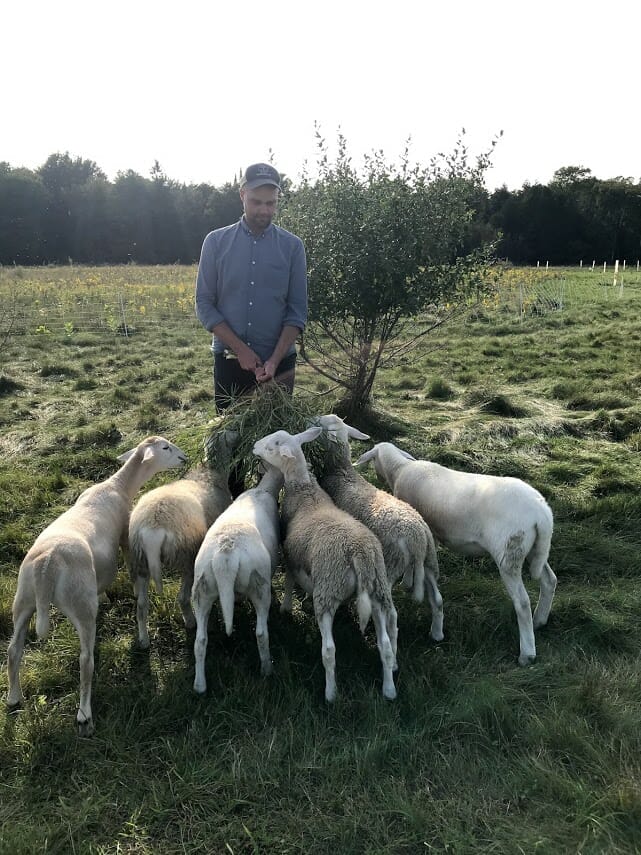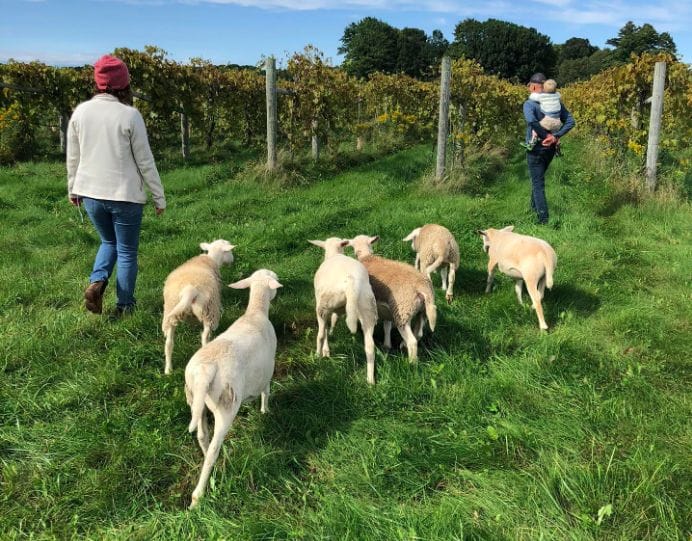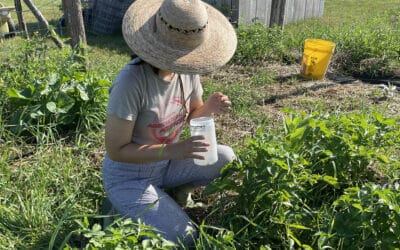by Russell Rolffs, farm manager
This year, Gathering Ground grazed six White Dorper sheep, rotating them through the vineyard June to August and then the young chestnut and fruit orchards the rest of the season. Combining livestock with crops is a sustainable practice because it creates a harmonious relationship between two agricultural pursuits wherein the wastes of one are the inputs of another. It can provide an alternative to herbicides and synthetic fertilizers, and decrease soil compaction from using heavy equipment for mowing. One of Gathering Ground’s larger goals is to demonstrate sustainable practices like this and learn some best practices to provide resources to other growers who wish to do the same.
All in all, the sheep were a great success. White Dorpers are docile, easy to manage, and don’t bother grapevine trunks or get aggressive with tree protective tubes. Managing weeds in the organic vineyard is a major challenge. Mowing between rows is easy enough, but suppressing weeds in the row is labor intensive and just plain tricky.

The sheep did a great job munching and trampling weeds in the vine rows. We encouraged them to focus on these hard to reach places by mowing the grass very short between rows. We managed the sheep to do mob-grazing by using an electric fence. Mob-grazing is a technique used with several types of livestock in which animals are encouraged to graze heavily in one area for a short time, mimicking how pack animals behave naturally when they are not protected and at risk from predators, eating intensively in one area together and moving frequently. We fenced the sheep in with an electric net fence and kept them grazing for four or five days at a time, two vineyard rows in each rotation. The result was beautiful. The weeds were munched and trampled down to a couple inches, and fertilizer was left behind. What an elegant solution! What was once a competitive weed became fertilizer thanks to the sheep.
Inevitably, though, it was not all roses. The challenges were many, and will take a lot of practice and refinement to make the two pursuits cooperate well. For example, cold climate wine grapes are fussy and vulnerable to pests and fungal diseases and so require frequent spraying. Well, guess what. The sheep are constantly in the way, making management difficult. One solution may be to have a permanent or semi-permanent fence set up just outside the vineyard that animals can be herded to during spraying.
Damage to the crop is another challenge, but fortunately sheep are not as aggressive as goats, and don’t tear at the bark on the vine trunk. In fact, the sheep were actually helpful in trimming the shoots on the trunk that grew within their reach as these are undesirable from a fruit-growing perspective.
Protecting young vines is the real challenge when it comes to crop damage from sheep. Gathering Ground is planting a new grape called Itasca, and these young vines are easily reached and clipped by the sheep. Of the 100 we planted this spring, a few were nibbled to the ground by the sheep after they managed to knock off the protective tubes.
Mostly though, we just had a lot of fun with the sheep, and it brought a lot of interest to the Grounds and made the space more interactive for children and adults. In the end, they were almost like pets, which created a lot of cognitive dissonance when it came time to take them to market and sparked a lot of interesting conversations about the ethics of eating meat. We treat our pets so well, while most animals raised for meat are factory farmed and live on concrete slabs and don’t have space to turn around. That is why I value so much knowing folks on the Island and elsewhere in Wisconsin who do a terrific job of raising animals in a way that treats them with respect.

I want to thank everyone on the Island who helped this year. It takes a village, and we received valuable advice from Kirby Foss, Lee Baxter, and Donna Briesemeister on raising livestock and sheep specifically. Thank you. Thanks also to Rachel Schwandt, Mari Anderson, Scott Swarm, and our interns Alex and Izzy Krantz for helping bring water to the sheep, and thanks Robyn Marie and her family for loving the sheep so deeply. Thank you also to everyone who joined the sheep blessing with Pastor Alan.




0 Comments